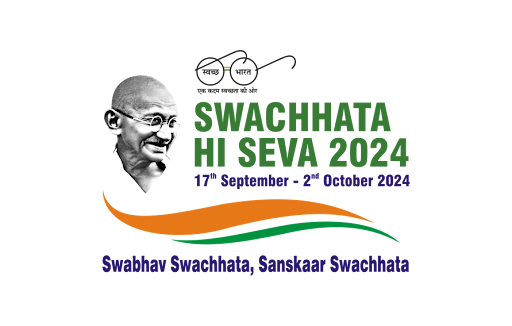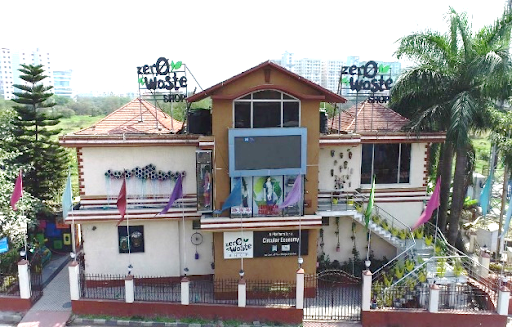
The ‘Zero Shop’: New Town Kolkata’s Circular Economy in Action
‘Circular economy - an approach that aims to reduce waste and make the most of resources by reusing, recycling, and regenerating products and materials throughout product lifecycles.’
In a world increasingly encumbered by waste, New Town Kolkata is making strides with its pioneering initiative - The Zero Shop. By promoting recycling and upcycling, the Zero Shop not only addresses critical resource management concerns but also empowers local community members, particularly women in nearby villages by providing livelihood options
Origins of The Zero Shop: A City Authority Driven Initiative
This unique initiative was jointly developed by the New Town Kolkata Development Authority (NKDA) and the New Town Kolkata Green Smart City Corporation Limited (NKGSCCL).
Its flagship outlet, located at the First Rotary in New Town, Kolkata, is a two storey building. The first floor houses the Zero Shop, and in line with initiative’s ethos, the building is adorned with upcycled and recycled items—ranging from old car tyres to plastic bottles, jars, and even bicycles.
The outlet constructed by the NKDA and funded by NKGSCCL, demonstrates the authorities' commitment to sustainability. The NKDA Estate Management Section oversees daily operations, while the NKDA Engineering Section is responsible for repairs and maintenance.

Figure 1 Location of the Zero Shop in New Town Kolkata

Figure 2 The Zero Shop main outlet at New Town First
An Empowering Ecosystem: Collaboration between City Authorities, NGOs and Citizen
One of the most remarkable features of the Zero Shop is its inclusive operational model that fosters social empowerment. Managed by an all-women Self-Help Group (SHG), the shop recycles various used items, mostly sourced from the nearby villages, thereby creating a sustainable loop of waste to wealth. . While the SHG collects and recycles waste, NKDA specifically collects used clothes and books from within the city, promoting an urban-rural synergy.

Figure 3 Livelihood generation for SHG members associated with the Zero Shop
The involvement of local women in recycling and upcycling initiatives provides them with gainful employment and income. In the two years since its inception, the Zero Shop has offered livelihoods to around 400 women from 32 SHGs, increasing their income by 3.4 times, and transforming waste into high-quality handicrafts, utility items, and garments for all.
To bolster collective responsibility of the citizens towards the waste they generate, the shop offers donation counter wherein residents from New Town Kolkata and other areas of Kolkata are encouraged to donate their used clothes. The donated clothes are carefully sorted, washed, ironed, and displayed at the Shop for resale.
What makes this model noteworthy is its affordability—clothes are sold at nominal prices ranging from Rs 20 to Rs 100, ensuring people from various economic backgrounds reap the benefits from the initiative. Although the Zero Shop operates on a not-for-profits basis, its revenue generation is noteworthy. Between July 2023 and July 2024, approximately 7,000 pre-owned clothes were sold generating around INR 3 lakh. This success underscores the growing acceptance of second-hand shopping and recycling in urban India.


Figure 4 Upcycled items being sold at the Zero Shop
Beyond Waste – Nurturing Community Engagement
The Zero Shop is not limited to selling recycled clothes or items made out of upcycled waste. It also serves as a repository for second-hand donated books and periodicals, furthering the ethos of reuse. Donations are recorded meticulously in a register, with the names of donors listed alongside the books they’ve contributed. These books find their place at the Book Club, located at Futsal Ground in Action Area II, New Town Kolkata, a free sit-and-read space popular among avid readers. It is intended to open more such clubs across the city.
In addition to its role as a retail outlet, the Zero Shop hosts various workshops and seminars on environmental sustainability. Topics such as recycling, household solid waste segregation, and alternatives to single-use plastics are regularly discussed. These efforts contribute to public awareness, embedding sustainability as a core value in the community.

Figure 5 Book Club at Futsal Ground, Action Area II, New Town Kolkata

Figure 6 Knowledge dissemination sessions
Expanding Reach: From Fairs to Festivals
Expanding its footprint across and beyond New Town Kolkata, the Zero Shop is establishing several branches and stalls at fairs, festivals, and within private housing complexes during local celebrations. Events like Sabala Mela and Saras Mela have provided additional platforms for the Zero Shop to engage with large audience, thereby introducing many to the importance of recycling and upcycling.
Engaging and relatable cultural programs accompanying the Shop’s stalls has strengthened the message of upcycling among the general public.


Figure 7 Recycling activities as a part of the initiative
Blueprint for the Future – CITIIS 2.0
By recycling and upcycling approximately 300 kg of waste materials, the Zero Shop has alleviated city's solid waste management burden while also empowering marginalised women through livelihood opportunity that simultaneously support environmental conservation.
As part of its revenue-generating strategy, the Zero Shop is planning additional features, such as a pay-and-use toilet to be installed at its main outlet, located at a prime junction in New Town. This facility will help cross-subsidise the operations of the Shop and the Book Club, further ensuring the sustainability of the initiative.
The Zero Shop’s success offers an opportunity to introduce this replicable model in other cities. As it prepares to expand the initiative under the CITIIS 2.0 program, the Shop exemplifies the power of collaboration between local authorities, communities, and self-help groups to generate revenue, enhance awareness, and create livelihoods.
Showcasing its potential for growth, the Zero Shop is poised to make even greater contributions to New Town Kolkata's journey for a greener, more sustainable future – ‘one recycled item at a time.’

Figure 8 The Zero Shop adorned with upcycled materials

Figure 9 Zero Shop stall at ‘Sabala Mela’

Figure 10 Zero Shop stall at ‘Saras Mela'
The blog is written by Naim Keruwala (Program Director, CITIIS) and Uttra Dasgupta (Knowledge Officer, CITIIS)
Add new comment